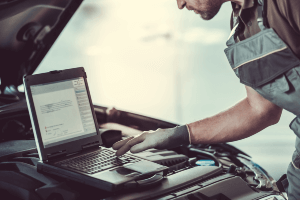 When a plane crashes, investigators often rely on the black box to reconstruct the scene to determine the cause of the crash. But did you know that many cars today also have a black box that could be used to assess what happened in a crash and potentially determine fault?
When a plane crashes, investigators often rely on the black box to reconstruct the scene to determine the cause of the crash. But did you know that many cars today also have a black box that could be used to assess what happened in a crash and potentially determine fault?
Below, our car accident lawyers in South Bend discuss how the black box in a vehicle could be used to help prove liability for an accident.
What Is a Black Box?
A black box, properly known as an Event Data Recorder (EDR), is an electronic device installed in a vehicle that can record information about a vehicle before, during and immediately after a crash. Generally, an EDR is part of a vehicle’s airbag or powertrain control systems.
Not every vehicle has an EDR, but as of 2014, about 96 percent of new models had one built into them, according to a study from car research site Edmunds. Because so many vehicle manufacturers started voluntarily installing black boxes in most of their vehicles, the National Highway Traffic Safety Administration (NHTSA) said in 2019 that it would not make EDRs a requirement in every truck and car.
What Does the Black Box Record?
The EDR in vehicles was designed to monitor the metrics used to signal the deployment of airbags, which is why it is attached to the airbag system in the vehicle. These devices collect two main types of data:
- Non-deployment event – No airbag is deployed but both pre- and post-crash data are recorded.
- Deployment event – Airbag(s) deployed and there is data collection during the crash and pre-crash. Some post-crash data may be collected depending on the extent of damage to the vehicle.
There is no universal standard from the NHTSA regarding the exact type of information the EDR records before, during or after a crash, but there is a consensus that the unit may record anywhere between 15 or more variables about 20 seconds before a crash and five to 10 seconds after impact. The recorded information may include:
- Speed
- Acceleration
- Engine RPM
- Steering
- Crash force
- Crash duration
- Brake activation
- Seatbelt use
- Position of front seats
- Number of impacts
- Airbag deployment
It is important to note that EDRs only work when a vehicle is turned on, so the victim of an accident involving a parked car without a running ignition would not be able to use the black box to prove liability.
How Can Black Box Data Be Used To Prove Liability?
Accessing the data from an accident on an EDR is not only difficult, which is why it is often necessary to bring in car accident reconstruction experts who have the proper tools.
In the past, courts have admitted the use of black box data as evidence in civil proceedings. The data has helped injury victims fill gaps in their story about the crash.
Due to the nature of the data collected by the vehicle’s black box, it could be used to prove liability for accidents such as:
- Multi-vehicle collisions
- He said/she said accidents
- Accidents in which the severity of an injury is in question
Can Black Box Data Be Used Against Me?
While federal law dictates that the owner of the vehicle is the only person who has the right to access the data in a vehicle’s black box, it also allows for the owner to give permission for accessing that data. The insurance company will likely try and take advantage of this and request written or recorded permission from you to access the data before you do so they may analyze it to find a reason to deny or devalue your claim.
Drivers who have user-based car insurance tracking devices in their vehicles should also be wary since these devices are normally connected to the vehicle’s black box. If your accident involves a car whose driver is also insured by your auto insurance company, they may already have access to your data.
Before signing any paperwork or agreeing to any recorded conversation, speak to one of our licensed attorneys who may be able to provide legal advice throughout the legal process.
Get Help With Your Legal Claim. Call Today
If you were injured in an accident and the at-fault driver is denying liability, our attorneys have the resources to thoroughly investigate to determine what happened and help you pursue compensation for your damages.
We do not charge you anything up front and only get paid if you do, so there is no risk to call. Our firm has a successful track record of recovering millions in compensation on behalf of our clients.
Call today for a free consultation: (574) 444-0741













